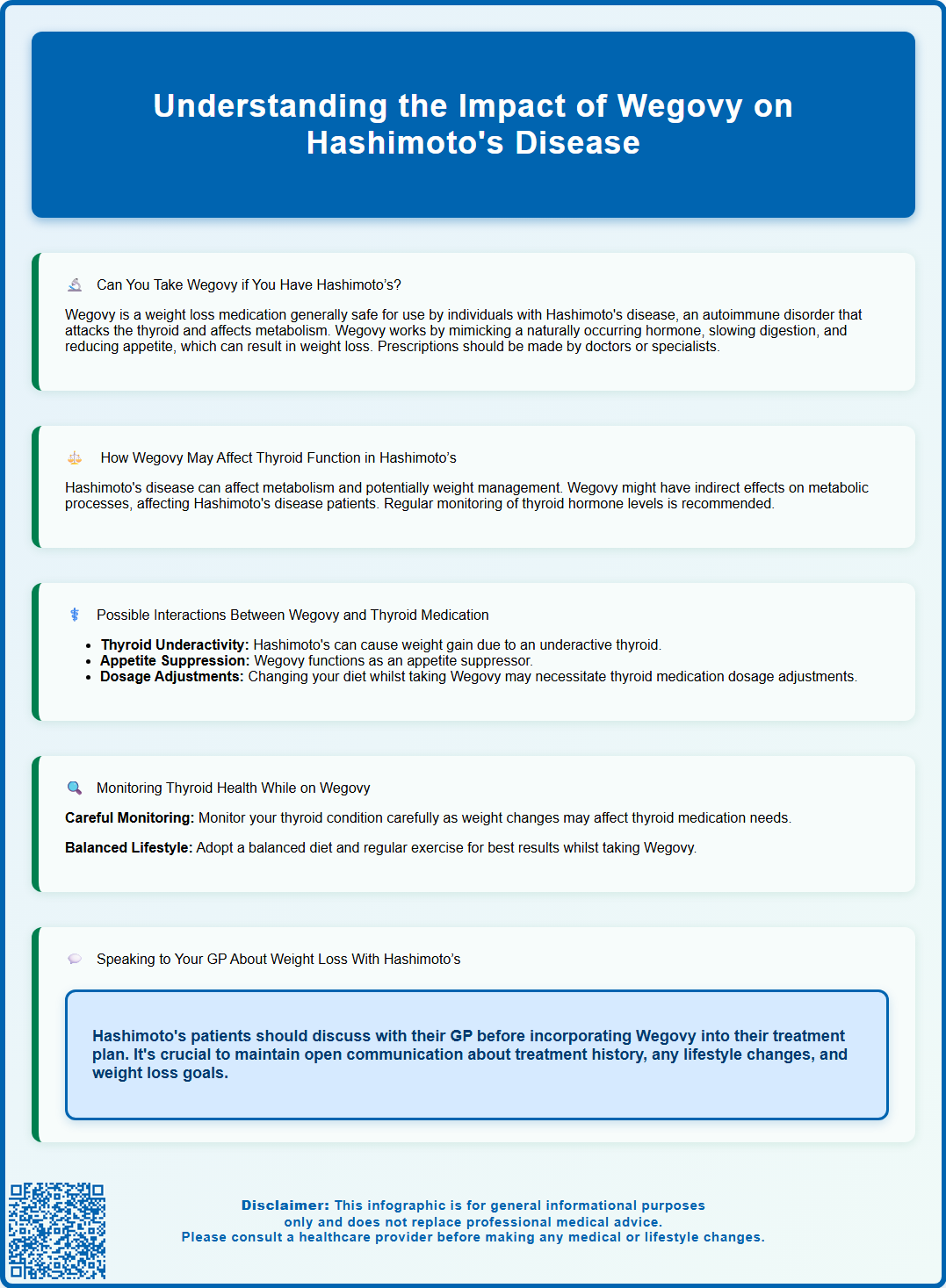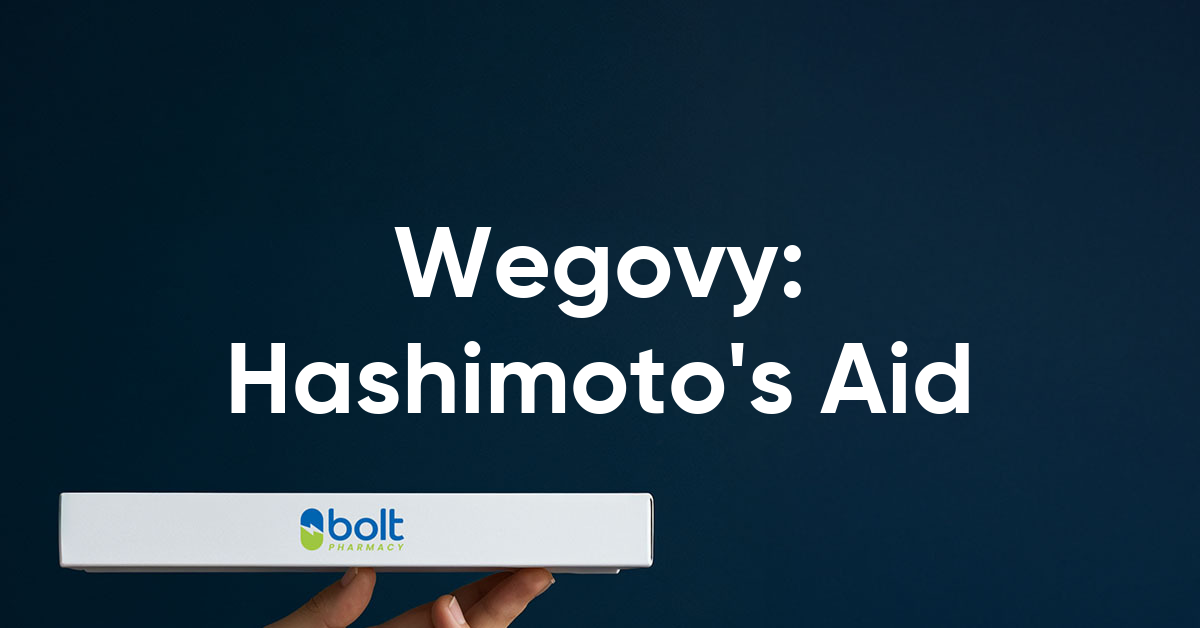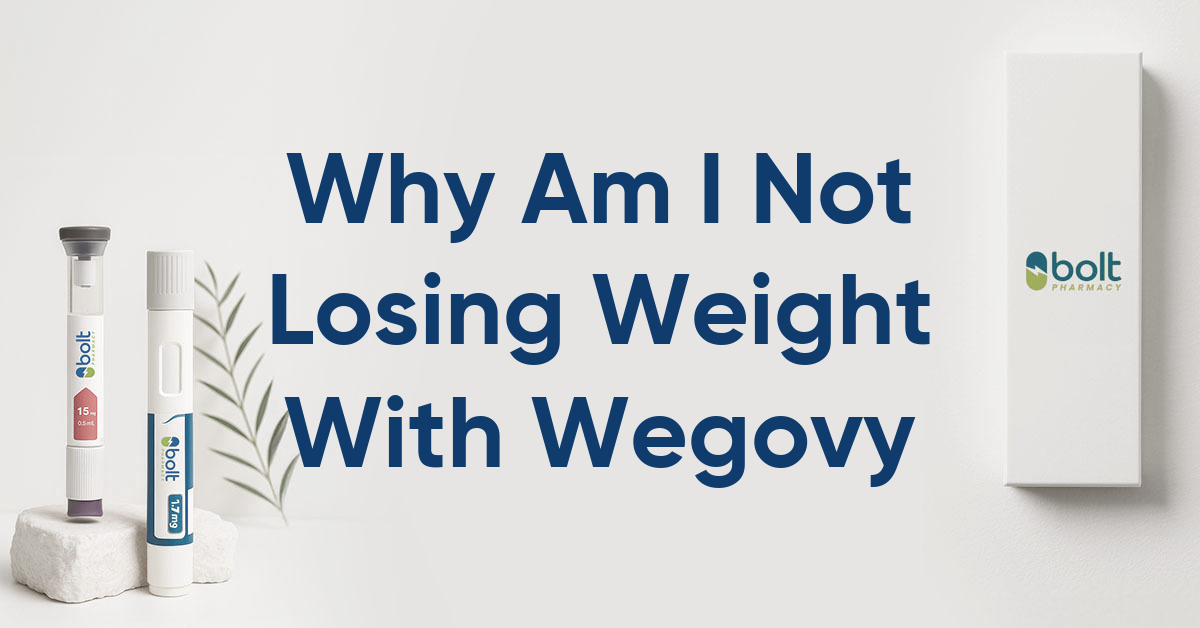The quest for effective, lasting weight loss solutions can be daunting, more so when navigating the intricate avenues of metabolic health and GLP-1 treatments such as Wegovy. At Bolt Pharmacy, we understand this challenge. In our latest deep, dive, we explore the intersection of Wegovy and Hashimoto's, shedding light on the role of this pioneering GLP-1 medication in weight management and its relevance for those wrestling with this common thyroid disorder. Ready to unveil the potential of this metabolic health game, changer? Dive in!
Summary: Yes, people with Hashimoto's disease can usually take Wegovy (semaglutide), provided it is prescribed and monitored by a healthcare professional.
- Hashimoto's disease is an autoimmune condition that affects the thyroid gland, reducing hormone production and slowing metabolism.
- Wegovy is a GLP-1 receptor agonist that helps regulate blood sugar, slows stomach emptying, reduces appetite, and supports weight loss.
- Wegovy does not directly affect thyroid hormones, but weight loss achieved during treatment may influence thyroid medicine requirements.
- There are no known direct interactions between Wegovy and common thyroid medicines such as levothyroxine, though dosage adjustments may be needed as weight changes.
- Common side effects of Wegovy include nausea, vomiting, diarrhoea, constipation, abdominal pain, and decreased appetite. Rare but serious risks include pancreatitis and gallbladder problems.
- Regular monitoring of thyroid function and overall health is recommended while using Wegovy, especially if you are also taking thyroid medicine.
Table of Contents
Understanding Wegovy and Hashimoto's Thyroiditis
Wegovy (semaglutide 2.4mg) is a glucagon-like peptide-1 (GLP-1) receptor agonist licensed by the MHRA for chronic weight management in adults with obesity or overweight with weight-related comorbidities, and also for adolescents aged 12 years and above. It works by mimicking the action of the naturally occurring hormone GLP-1, which regulates appetite and food intake through effects on the brain's satiety centres. Wegovy slows gastric emptying, reduces hunger, and increases feelings of fullness, leading to reduced caloric intake and subsequent weight loss. The STEP clinical trials have demonstrated average weight reductions of 10-15% of body weight over 68 weeks when combined with lifestyle modifications.
Hashimoto's thyroiditis, also known as chronic lymphocytic thyroiditis, is the most common cause of hypothyroidism in the United Kingdom. This autoimmune condition occurs when the immune system produces antibodies that attack the thyroid gland, gradually destroying thyroid tissue and impairing hormone production. Patients typically present with elevated thyroid peroxidase (TPO) antibodies and thyroglobulin antibodies, alongside reduced thyroid function evidenced by elevated thyroid-stimulating hormone (TSH) and low free thyroxine (FT4) levels. According to NHS estimates, hypothyroidism affects approximately 1-2% of the UK population, with a significantly higher prevalence in women.
Many individuals with Hashimoto's thyroiditis experience weight gain as a consequence of reduced metabolic rate associated with hypothyroidism. Even when adequately treated with levothyroxine replacement therapy, some patients continue to struggle with weight management. This has led to increased interest in whether medications like Wegovy might offer additional support for weight loss in this patient population, whilst raising important questions about safety and potential interactions with thyroid function.
Can You Take Wegovy with Hashimoto's Disease?
Hashimoto's thyroiditis is not listed as a contraindication to Wegovy treatment in the current Summary of Product Characteristics (SmPC) approved by the MHRA. Patients with well-controlled hypothyroidism secondary to Hashimoto's disease who are stable on levothyroxine replacement therapy may be considered for Wegovy treatment, provided they meet the eligibility criteria for weight management therapy. According to NICE Technology Appraisal 875 (TA875), these criteria typically include a body mass index (BMI) of 35 kg/m² or above, or 32.5 kg/m² or above for people from South Asian, Chinese, other Asian, Middle Eastern, Black African or African-Caribbean family backgrounds, with at least one weight-related comorbidity.
However, the decision to prescribe Wegovy to someone with Hashimoto's thyroiditis requires careful clinical assessment. Prescribers must ensure that thyroid function is optimised and stable before initiating GLP-1 receptor agonist therapy. Uncontrolled hypothyroidism should be addressed first, as inadequate thyroid hormone replacement can contribute to weight gain and may complicate the assessment of Wegovy's effectiveness. Additionally, patients should have regular thyroid function monitoring, as weight loss itself can sometimes necessitate adjustments to levothyroxine dosing.
It is important to note that there is no official link established between Wegovy and worsening of autoimmune thyroid disease. The medication does not directly interact with levothyroxine or interfere with thyroid hormone replacement therapy. Nevertheless, individual patient factors, including the presence of other autoimmune conditions, cardiovascular risk factors, and previous tolerance of weight loss interventions, should inform the prescribing decision.
Patients should be counselled about realistic expectations, potential side effects, and the importance of continued thyroid monitoring throughout treatment. Women of childbearing potential should use effective contraception while taking Wegovy and should discontinue treatment at least 2 months before a planned pregnancy, as semaglutide is not recommended during pregnancy or breastfeeding. For patients with diabetes, additional monitoring for diabetic retinopathy is recommended, and those on insulin or sulfonylureas may require dose adjustments to prevent hypoglycaemia.
In the NHS, Wegovy is typically prescribed through specialist weight management services (Tier 3) in accordance with NICE guidance and local commissioning arrangements.

How Wegovy May Affect Thyroid Function
The relationship between semaglutide and thyroid function has been subject to scrutiny, particularly following observations in animal studies. Rodent studies identified an increased incidence of thyroid C-cell tumours with GLP-1 receptor agonists. However, it is crucial to understand that humans have significantly fewer GLP-1 receptors on thyroid C-cells compared to rodents, and extensive post-marketing surveillance and clinical trial data have not demonstrated an increased risk of medullary thyroid carcinoma in human populations. The UK SmPC for Wegovy includes a warning about these findings but does not list a history of medullary thyroid carcinoma or Multiple Endocrine Neoplasia syndrome type 2 (MEN 2) as formal contraindications, unlike in some other jurisdictions.
For patients with Hashimoto's thyroiditis, there is currently no evidence to suggest that Wegovy directly affects thyroid autoimmunity or accelerates the progression of autoimmune thyroid disease, though research specifically examining this relationship is limited. The medication has not been shown to alter TPO antibody levels or influence the inflammatory processes underlying Hashimoto's thyroiditis based on available data. However, the weight loss achieved with Wegovy may have indirect effects on thyroid hormone requirements. As body weight decreases, the dose of levothyroxine needed to maintain euthyroidism may change, typically requiring a reduction in thyroid hormone replacement. This is a physiological response to reduced body mass rather than a direct drug interaction.
Clinicians should be aware that the gastrointestinal effects of Wegovy, particularly nausea and delayed gastric emptying, could theoretically affect the absorption of levothyroxine if both medications are taken simultaneously. Current guidance recommends taking levothyroxine on an empty stomach, typically 30-60 minutes before breakfast, and this timing should be maintained in patients receiving Wegovy. There is no evidence to suggest that the standard once-weekly subcutaneous administration of Wegovy interferes with the daily oral absorption of levothyroxine when appropriate dosing schedules are followed. Given levothyroxine's narrow therapeutic index, thyroid function should be reassessed 6-8 weeks after significant weight loss or if persistent gastrointestinal symptoms develop.
Monitoring and Safety Considerations
Patients with Hashimoto's thyroiditis who commence Wegovy treatment require a structured monitoring protocol to ensure both safety and therapeutic effectiveness. Baseline thyroid function tests, including TSH and free T4, should be documented before initiating treatment, with the patient ideally in a euthyroid state on stable levothyroxine replacement. While no specific monitoring schedule is mandated in the UK, a pragmatic approach would be to reassess thyroid function 6-8 weeks after significant weight loss (>5% of body weight), after any dose changes to levothyroxine, or if symptoms suggestive of thyroid dysfunction emerge. Otherwise, standard annual thyroid function monitoring is appropriate for stable patients. Weight loss of 10% or more may necessitate levothyroxine dose adjustments, and patients should be educated to recognise symptoms of both hypothyroidism (fatigue, cold intolerance, constipation) and hyperthyroidism (palpitations, anxiety, tremor) that might indicate the need for dose modification.
Standard monitoring for Wegovy treatment applies equally to patients with Hashimoto's disease. This includes assessment of gastrointestinal tolerability, particularly during dose escalation, and vigilance for signs of pancreatitis (severe persistent abdominal pain radiating to the back). Patients should be counselled about common adverse effects including nausea, vomiting, diarrhoea, and constipation, which typically improve over time. Blood pressure and heart rate should be monitored, particularly in patients with pre-existing cardiovascular conditions, which may be more prevalent in those with longstanding hypothyroidism. GLP-1 receptor agonists are associated with a modest increase in heart rate.
Additional safety considerations include the risk of gallbladder disease (cholelithiasis, cholecystitis) and the potential for dehydration and acute kidney injury with severe gastrointestinal side effects. Patients with diabetes require monitoring for diabetic retinopathy, particularly if they have a history of retinopathy and rapid improvement in glycaemic control.
Patients should be advised to contact their GP if they experience symptoms such as a lump or swelling in the neck, persistent hoarseness, difficulty swallowing, or shortness of breath, as these warrant thyroid examination. Additionally, individuals should be counselled about the importance of maintaining adequate hydration, particularly if experiencing gastrointestinal side effects, and continuing their levothyroxine as prescribed without interruption. Regular review of weight loss progress, typically every three months, allows assessment of treatment response and consideration of whether continuation is appropriate according to NICE TA875, which recommends discontinuation if less than 5% weight loss is achieved after six months at the maintenance dose.
Patients should be encouraged to report suspected adverse reactions to the MHRA Yellow Card scheme.
Alternative Weight Management Options for Hashimoto's Patients
For patients with Hashimoto's thyroiditis who are not suitable candidates for Wegovy, or who prefer alternative approaches, several evidence-based weight management strategies exist. Optimisation of thyroid hormone replacement remains the foundation of treatment, as inadequately treated hypothyroidism significantly impairs metabolic rate and makes weight loss considerably more challenging. Regular monitoring and appropriate dose adjustment of levothyroxine to maintain TSH within the reference range (typically 0.4-4.0 mU/L, though individualised targets may apply) is essential before implementing additional weight management interventions.
Structured lifestyle modification programmes, as recommended by NICE guidance CG189, form the cornerstone of weight management for all patients, including those with Hashimoto's disease. These programmes typically involve dietary modification with a caloric deficit of 500-600 kcal per day, increased physical activity with a target of 150-300 minutes of moderate-intensity exercise weekly, and behavioural support to address eating patterns and psychological factors. Referral to NHS-commissioned weight management services, dietetic services, or commercial programmes with evidence of effectiveness (such as those meeting NICE quality standards) should be considered. Some patients may benefit from very low-calorie diets (800 kcal/day) under medical supervision, particularly those with type 2 diabetes or significant obesity-related complications, as outlined in NICE CG189.
Alternative pharmacological options include orlistat, a lipase inhibitor that reduces dietary fat absorption, which may be prescribed for patients with BMI ≥28 kg/m² with associated risk factors or BMI ≥30 kg/m². It is important to note that orlistat can reduce levothyroxine absorption, and the BNF recommends separating administration by at least 4 hours and monitoring thyroid function. Patients should also be counselled about gastrointestinal side effects and the need for fat-soluble vitamin supplementation. Other GLP-1 receptor agonists such as liraglutide 3mg (Saxenda) or tirzepatide (Mounjaro, per NICE TA1026) may be considered according to local commissioning arrangements and NICE guidance.
For patients with severe obesity (BMI ≥40 kg/m² or ≥35 kg/m² with comorbidities) who have not achieved adequate weight loss with non-surgical interventions, bariatric surgery may be considered following specialist assessment, as outlined in NICE CG189. Procedures such as gastric bypass or sleeve gastrectomy have demonstrated significant long-term weight loss and improvement in obesity-related comorbidities, though patients require lifelong monitoring including thyroid function assessment, as malabsorption may affect levothyroxine requirements. All weight management approaches should be individualised, taking into account patient preferences, comorbidities, and the multifactorial nature of weight regulation in Hashimoto's thyroiditis.
Scientific References
- Wegovy 0.25 mg, FlexTouch solution for injection in pre-filled pen - Summary of Product Characteristics (SmPC).
- Semaglutide for managing overweight and obesity. Technology appraisal guidance [TA875].
- Once-Weekly Semaglutide in Adults with Overweight or Obesity.
- Wegovy - EPAR Product Information.
- Thyroid disease: assessment and management. NICE guideline [NG145].
- Screening for Thyroid Disease.
Frequently Asked Questions
Can I take Wegovy if I'm diagnosed with Hashimoto's disease?
Yes, in most cases Wegovy (semaglutide) can be used safely in people with Hashimoto’s disease. However, treatment should always be guided by a healthcare professional, who can monitor your overall health and thyroid status as part of your care.
Does Wegovy affect my thyroid function if I have Hashimoto's?
Wegovy does not directly interfere with thyroid hormone production or thyroid function. However, weight loss and metabolic changes during treatment may influence how your thyroid condition is managed. Regular thyroid function tests under the supervision of a healthcare professional are recommended.
Are there any interactions between Wegovy and thyroid medicines?
There are no known direct interactions between Wegovy and commonly used thyroid medicines such as levothyroxine. However, weight loss achieved with Wegovy may change your dosage requirements for thyroid medicine. Regular follow-up with your healthcare professional is important to check whether adjustments are needed.
The health-related content published on this site is based on credible scientific sources and is periodically reviewed to ensure accuracy and relevance. Although we aim to reflect the most current medical knowledge, the material is meant for general education and awareness only.
The information on this site is not a substitute for professional medical advice. For any health concerns, please speak with a qualified medical professional. By using this information, you acknowledge responsibility for any decisions made and understand we are not liable for any consequences that may result.
Heading 1
Heading 2
Heading 3
Heading 4
Heading 5
Heading 6
Lorem ipsum dolor sit amet, consectetur adipiscing elit, sed do eiusmod tempor incididunt ut labore et dolore magna aliqua. Ut enim ad minim veniam, quis nostrud exercitation ullamco laboris nisi ut aliquip ex ea commodo consequat. Duis aute irure dolor in reprehenderit in voluptate velit esse cillum dolore eu fugiat nulla pariatur.
Block quote
Ordered list
- Item 1
- Item 2
- Item 3
Unordered list
- Item A
- Item B
- Item C
Bold text
Emphasis
Superscript
Subscript












